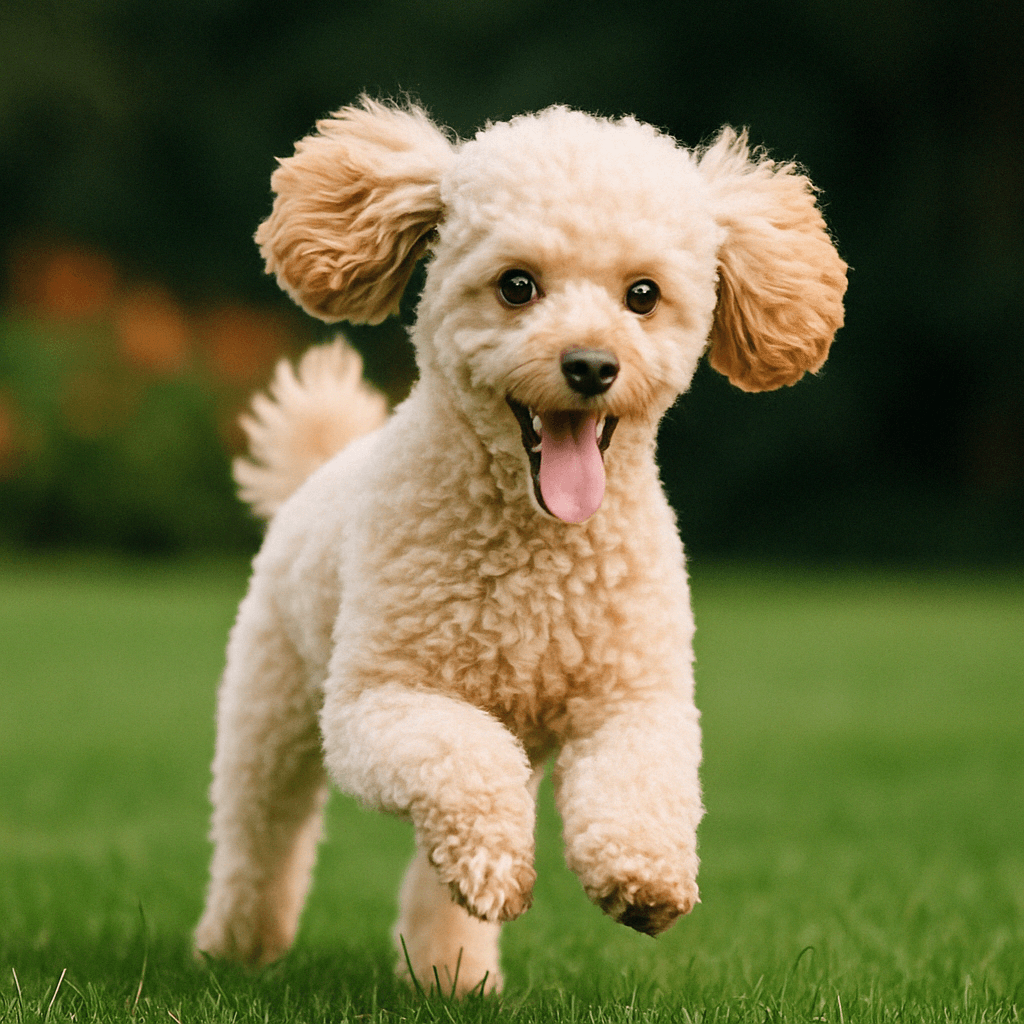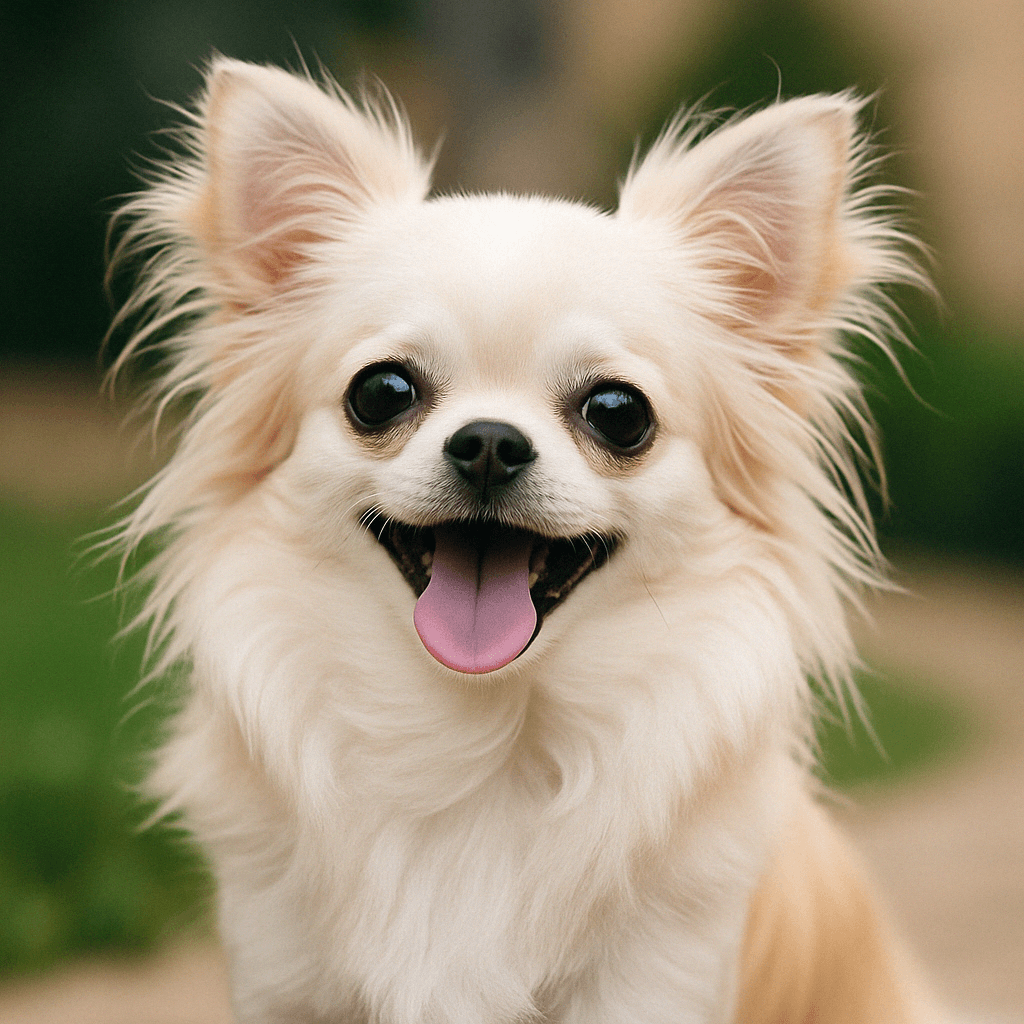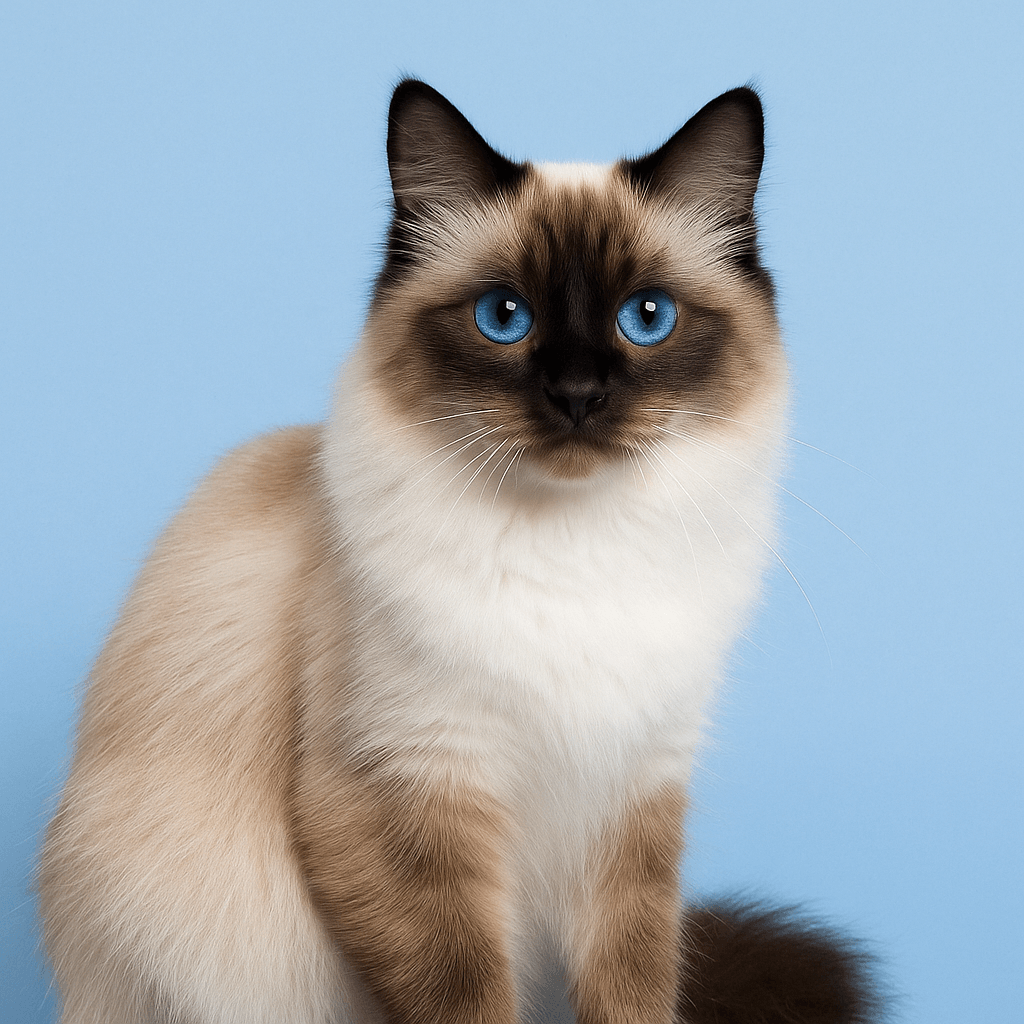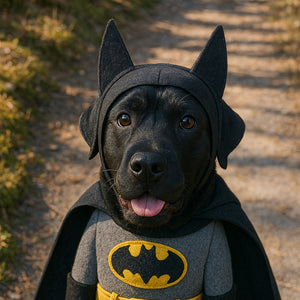
🐩 Miniature Poodle – elegant, smart and full of energy
📌 Table of Contents
The history and origin of the miniature poodle
The Poodle is one of the oldest breeds of ornamental and utility dogs, with a history dating back at least several hundred years. Although many associate it with France, its roots lie in Germany, where it was originally used as a waterfowl retriever. The word "Poodle" itself comes from the German "pudeln," meaning "to splash in water."
The miniature version emerged from the deliberate selection of smaller specimens in the 18th century, primarily intended as companions for the aristocracy. Miniature Poodles quickly gained popularity as lapdogs and companions for the upper classes. Their intelligence, charm, and ability to learn tricks also made them popular in circuses and shows.
Today, the Miniature Poodle combines both its utility and ornamental heritage, offering the perfect balance of energy, beauty and loyalty.

Appearance and body structure
The Miniature Poodle is a dog with a harmonious silhouette and an exceptionally elegant appearance. Despite its small size, it has a well-proportioned body, a proud gait, and graceful movements. Its distinctive posture and light, springy gait are eye-catching, especially when neatly trimmed.
-
Height at the withers : 28–35 cm
-
Weight : 4–7 kg
-
Figure : square, proportional, with a well-defined chest and loins
-
Head : long, noble, with a clearly defined stop
-
Eyes : almond-shaped, expressive, dark and very intelligent
-
Ears : long, drooping, set high, richly furred
-
Tail : Carried high, often docked where permitted; in undocked dogs, slightly curved upwards.

Coat and color
The Miniature Poodle's coat is one of its greatest advantages:
-
Coat type : thick, curly (or corded - less common), without undercoat
-
Function : insulates against cold and heat, but requires intensive care
-
Hairstyles : classic (e.g. continental, English saddle), modern (e.g. teddy bear, puppy cut)
The poodle comes in a wide range of colors:
-
solid: black, white, brown, silver, apricot, red, fawn
-
Varieties with the merle or phantom gene are also becoming more common (although they are not recognized by all cynological federations)

The Miniature Poodle's coat lends itself to creative styling, making it one of the most frequently exhibited breeds at dog shows. Its presence is the result of its harmonious build, well-groomed coat, and confident gait.
The personality and behavior of the miniature poodle
The Miniature Poodle is intelligent, attentive, and very devoted to its owner. It loves human contact and enjoys being around them all day long. It boasts exceptional intelligence—it's one of the smartest breeds in the world, making it incredibly versatile and easy to train.
-
Easy to train – learns new commands and tricks quickly
-
Cheerful and sociable – likes to be the center of attention
-
Emotionally sensitive – does not tolerate loneliness and noise well
-
Friendly towards children and animals , as long as he is properly socialized
-
Active and curious – needs physical and mental stimulation
Intelligence and the need for closeness
The Miniature Poodle is a fast learner – just a few repetitions are enough for him to understand and remember a command. He often tries to solve problems on his own, which makes it worthwhile to provide him with a variety of educational tasks and games. He is very perceptive and quickly adapts to human emotions, making him an ideal therapy dog.
At the same time, this dog is highly emotional – it becomes strongly attached to its owner and does not tolerate separation well. It can become jealous and even preoccupied if it doesn't receive adequate contact and attention. It is not suited to long-term solitude.
A sense of humor and innate elegance
The Miniature Poodle is also a true showman. He loves playing, performing tricks, and attracting attention. His expressiveness and natural grace make him a dog with great personality. He loves to please—and he knows how to get it!
Thanks to its temperament and trainability, the Miniature Poodle excels in therapy, dog therapy, and canine sports. It's a dog that loves to be active, engaged, and loved.
Care and health
Although the Poodle does not shed, its coat requires regular and thorough care. The lack of an undercoat prevents dead hair from falling out on its own – it must be regularly removed through brushing and clipping. Regular grooming is not only aesthetically pleasing but also beneficial for health, preventing mats, skin infections, and irritation.

Coat care:
-
Combing : 3–4 times a week, preferably with a natural bristle brush or a wide-toothed comb
-
Haircut : every 6–8 weeks, depending on the hairstyle and the intensity of hair growth
-
Baths : every 4–6 weeks using mild shampoos and conditioners designed for curly coats
-
Drying and styling : Drying and combing are recommended to maintain the desired shape of the coat.
Additional hygiene:
-
Ears : Clean once a week - Poodles are prone to fungal and bacterial infections
-
Eyes : regularly wiping the corners of the eyes from deposits and tears
-
Teeth : Daily brushing or use of dental chews - Poodles are prone to tartar build-up
-
Nails : check every 2-3 weeks – they often do not wear down naturally at home

Health:
Miniature Poodles are a long-lived breed – they often live 14–17 years, with some individuals even longer. To enjoy their presence for many years, it's important to remember preventative care and be vigilant for common breed ailments:
-
dental diseases (caries, periodontitis)
-
skin allergies and food intolerances
-
tracheal collapse
-
progressive retinal atrophy (PRA)
-
joint diseases and dysplasia
A balanced diet, exercise, and regular vet visits help keep your Poodle in excellent condition—both physically and mentally. They are prone to dental problems, ear problems, skin allergies, and hereditary conditions like progressive retinal atrophy (PRA) and hip dysplasia.
Training and physical activity
The Miniature Poodle loves activity and learning. This dog excels in dog sports such as agility, obedience, and nosework. Its intelligence and eagerness to cooperate make learning new commands a pure pleasure for both the dog and its owner.
-
Best methods : positive reinforcement, fun, short and varied sessions
-
Daily activity : at least 2 longer walks and sessions of physical and mental games
-
Educational toys : interactive smell mats, puzzles and flavor balls
-
Variety : it is worth introducing new walking routes, balance exercises, and learning tricks
Training recommendations:
-
Start training early – ideally at 8-10 weeks of age
-
Teach basic commands : "sit", "stay", "come to me", "go to your place", "let go" - these commands increase safety
-
Don't stop training after puppyhood - adult poodles love challenges and training too
-
Train in different conditions – outdoors, among other dogs, in the presence of noise and people
Kennel sports:
-
Agility – jumping over obstacles, tunnels, slaloms
-
Obedience – advanced obedience
-
Dog dancing – spectacular choreographies with a dog
-
Trick training – learning tricks, e.g. rolling, fetching, giving a paw
A lack of activities and stimulation can lead to frustration, barking, and destruction. The Miniature Poodle needs interaction with its owner, challenges, and space to grow. This breed is for active, patient, and creative owners who value daily development—and the joy of sharing life with an intelligent dog.

Who is the Miniature Poodle for?
The Miniature Poodle is a versatile companion dog that will thrive in many types of homes, provided its physical and emotional needs are regularly met. This breed combines elegance with a high level of sensitivity and a need for interaction.
Who will it be perfect for?
-
For people working remotely or spending a lot of time at home – the miniature poodle wants to be close to its owner and does not tolerate loneliness well.
-
For active families with children – provided that the children learn to be gentle and respectful towards the dog.
-
For seniors and older people – a sociable, affectionate and small dog that does not require great physical strength.
-
For allergy sufferers – due to the fact that they do not shed, the poodle is often better tolerated by people with allergies (although no dog is completely hypoallergenic).
-
For lovers of style and aesthetics – a well-groomed poodle looks stunning and always attracts attention.
-
For sports and dog training enthusiasts – the Miniature Poodle loves challenges and excels in agility, obedience and trick training.
When should you consider choosing a different breed?
-
If you spend most of the day away from home and don't have time for common activities.
-
If you don't like grooming, the poodle requires regular brushing and trimming.
-
If you are looking for an independent and unobtrusive dog, the Miniature Poodle needs a close bond with its humans.
This is a dog for those who want to feel the presence of a pet almost all the time - and in return they will receive not only joy and fun, but also complete trust, charm and endless loyalty.
Traveling and everyday comfort
The Miniature Poodle is an excellent travel dog – its small size and calm disposition make it ideal for both short and long trips. It is mobile, adaptable, and usually responds well to new places when accompanied by its beloved owner.
Comfortable travel with a miniature poodle:
-
Petto Oi Single car seat or Petto Oi Duo beige car seat – protects your dog while driving, provides comfort and a sense of security
-
Cabin and aircraft carriers – the breed's size allows for transport in the aircraft cabin
-
Travel bowls and a cooling mat – useful when stopping and on warm days
It's a good idea to combine regular trips with short breaks so your dog can stretch and rehydrate. A poodle that has familiar accessories (a bed, a favorite toy) will adjust to new surroundings much more quickly.
Comfort of everyday life:
The Miniature Poodle loves comfort and rituals – it's worth creating a safe, quiet space for them at home where they can relax.
-
Beds from the Petto SEN collection , such as Fluffy grey or Cozy ecru – perfectly suited to his size and sensitivity
-
Takai Steps – allow you to access the couch or bed without jumping and risking injury
-
Anti-slip mat – recommended for slippery floors to protect joints and make movement easier
Daily comfort also includes human proximity, peace, routine, and the ability to observe household members. Miniature Poodles prefer to relax wherever you are, so it's worth ensuring they have access to you whether you're working or relaxing.
Recommended products from Petto
Frequently Asked Questions (FAQ)
Is the Miniature Poodle suitable for beginners?
Yes, if the future owner is ready to care for the fur and provide daily exercise and mental activities.
How often should a miniature poodle be groomed?
Recommended every 6–8 weeks. The coat doesn't shed on its own, so it requires regular trimming or clipping.
Can a miniature poodle live in an apartment building?
Absolutely. This dog thrives in an apartment, as long as it's taken for daily walks and gets plenty of exercise.
Is the Miniature Poodle loud?
They can be prone to barking, especially when bored. Proper training and activity can help reduce excessive barking.
Will a miniature poodle get along with a cat?
As a rule, yes – provided that you get to know the cat gradually and that it has a calm nature.
Interesting facts about the Miniature Poodle
-
🧠 One of the smartest dogs in the world – the poodle ranks second in the intelligence ranking of breeds according to Stanley Coren.
-
🎩 A favorite of the aristocracy and artists , he was the darling of queens, painters, and actors. He performed at royal courts and on theater stages.
-
🎨 The dog of an artist and… circus performer – thanks to his intelligence and personal charm, he has performed in shows, operas and circuses for centuries.
-
✂️ A hairstyle with function – the characteristic poodle hairstyles were created to protect the joints and chest in cold water.
-
🐾 Hypoallergenic breed – the poodle's coat has no undercoat and does not fall out on its own, which makes it more friendly to allergy sufferers.
-
🌍 Popularity around the world – the Miniature Poodle is appreciated in Europe, the USA, Japan and Australia – both as a family dog and as a show dog.
Summary
The Miniature Poodle is a dog of exceptional charm, immense intelligence, and exceptional temperament. It requires commitment, care, and a close relationship with its humans, but it rewards them with boundless loyalty, joy, and elegance.
A perfect companion for families, singles, seniors, and allergy sufferers, this is a dog you can love wholeheartedly – always eager to play, ready to learn, and eager for its owner's attention.
If you dream of a dog that combines beauty, intelligence, and warmth, a miniature poodle may be your perfect choice.




 https://petto.com.pl
https://petto.com.pl